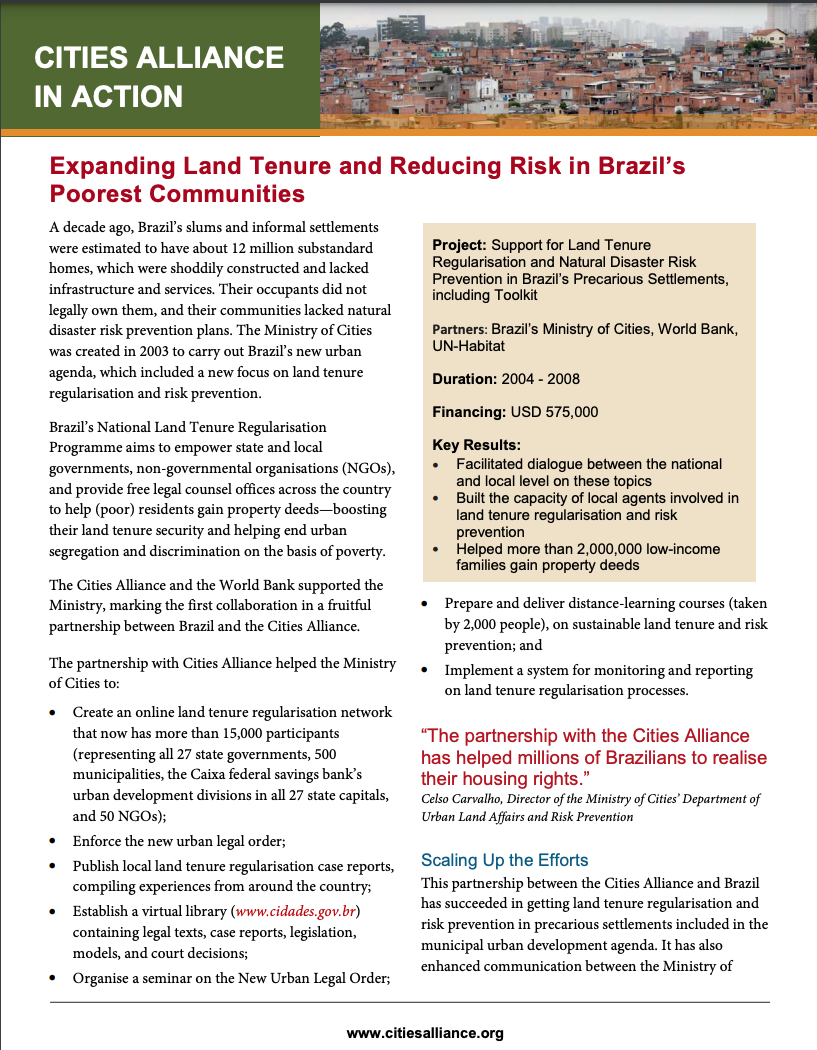- Who We Are
- How We Work
- Regional / Country Initiatives
- Legacy
- Core Themes
- Working Groups
- Portfolio & Results
- Newsroom
- Resources
Expanding Land Tenure and Reducing Risk in Brazil’s Poorest Communities
Expanding Land Tenure and Reducing Risk in Brazil’s Poorest Communities

This partnership between the Cities Alliance and Brazil has succeeded in getting land tenure regularisation and risk prevention in precarious settlements included in the municipal urban development agenda.
A decade ago, Brazil’s slums and informal settlements were estimated to have about 12 million substandard homes, which were shoddily constructed and lacked infrastructure and services. Their occupants did not legally own them, and their communities lacked natural disaster risk prevention plans. The Ministry of Cities was created in 2003 to carry out Brazil’s new urban agenda, which included a new focus on land tenure regularisation and risk prevention.
Brazil’s National Land Tenure Regularisation Programme aims to empower state and local governments, non-governmental organisations (NGOs), and provide free legal counsel offices across the country to help (poor) residents gain property deeds—boosting their land tenure security and helping end urban segregation and discrimination on the basis of poverty.
The Cities Alliance and the World Bank supported the Ministry, marking the first collaboration in a fruitful partnership between Brazil and the Cities Alliance.
The partnership with Cities Alliance helped the Ministry of Cities to:
-- Create an online land tenure regularisation network that now has more than 15,000 participants (representing all 27 state governments, 500 municipalities, the Caixa federal savings bank’s urban development divisions in all 27 state capitals, and 50 NGOs);
-- Enforce the new urban legal order;
-- Publish local land tenure regularisation case reports, compiling experiences from around the country;
-- Establish a virtual library (www.cidades.gov.br) containing legal texts, case reports, legislation, models, and court decisions;
-- Organise a seminar on the New Urban Legal Order;
-- Prepare and deliver distance-learning courses (taken by 2,000 people), on sustainable land tenure and risk prevention; and
-- Implement a system for monitoring and reporting on land tenure regularisation processes.
Scaling Up the Efforts
This partnership between the Cities Alliance and Brazil has succeeded in getting land tenure regularisation and risk prevention in precarious settlements included in the municipal urban development agenda. It has also enhanced communication between the Ministry of Cities and local agents, including in the more remote regions. And the success of the distance learning course led to more such courses (on other urban topics) that have reached more than 6,000 technicians and have supported mobilisation and knowledge-sharing efforts among professionals across the country.
The success of these activities prompted the government to strengthen its financial commitment, allocating nearly USD479 million to slum upgrading and land regularisation efforts from 2004 to 2006. A new law allowed free land tenure registrations, and an executive order sped up the process of securing land tenure on federal property.
As a result of these efforts, within just two years, more than a million low-income families, living in more than 200 municipalities, had lodged land tenure claims. But only a fifth of the claims had been recognised, and of those, only a third had been recorded. This highlighted a need to do more to overcome the lack of legal and practical expertise among public agents charged with carrying out regularisation procedures.
To address these issues, the Cities Alliance expanded its collaboration, enabling the Ministry to prepare a set of publications targeting city officials, representatives of social movements, district attorneys, and community associations. It was envisioned that this toolkit would help mobilise action and expand the scope and improve the efficiency of Brazil’s land tenure activities.
The toolkit contained:
-- A handbook for local government and state managers, as well as non-governmental officials, with step-by-step instructions on: Land tenure regularisation processes; how to prepare local regularisation plans and projects; and what administrative and legal measures to take;
-- A CD version of the virtual urban law library;
-- The textbook from the distance learning course; and
-- A primer on land tenure regularisation, using simple language and many illustrations, to help community associations, social movements, and residents.
The toolkit was initially distributed to city officials and members of the newly created network. Due to high demand, it was reprinted in 2009 and has now been distributed to all Brazilian municipalities, universities, think thanks, NGOs, community organisations, and relevant Federal Government departments.
As of 2012, two million low-income families—residing in 469 municipalities—had lodged land tenure claims. A monitoring and evaluation system has also been incorporated into the Ministry of Cities’ information programme.
The Cities Alliance support also led to the design of a Brazilian government programme that will invest nearly USD500,000 to reduce risks in informal settlements by making hillside homes more stable. And in 2012, the Cities Alliance approved a new grant to help design the National Monitoring System for Urban Settlement, which will provide risk prevention data.
Lessons Learned
Tracking the programme’s results enabled the Ministry to identify and address a bottleneck (the lack of expertise among public agents). Furthermore, capacity building and technical assistance initiatives are most effective if they are regular and continuous. It was important to follow up the toolkits with training activities to help the recipients use the materials. "
